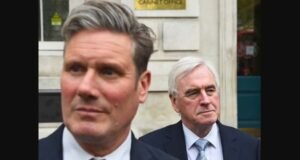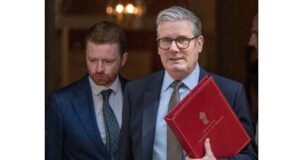 David Cameron has said he intends to stand down as Conservative Party leader and prime minister following the UK’s decision to leave the EU. He says his successor should be elected by the time of the party’s conference in October. What are the rules and who are the leading candidates?
David Cameron has said he intends to stand down as Conservative Party leader and prime minister following the UK’s decision to leave the EU. He says his successor should be elected by the time of the party’s conference in October. What are the rules and who are the leading candidates?
The party’s 1922 committee will oversee the contest. Its executive has suggested the contest should follow the system used to elect David Cameron in 2005, which would see MPs pick two candidates to put to the wider membership.
MPs wanting to stand need to be nominated by two others to get onto the ballot paper. If there are three or more candidates, a ballot or series of ballots will be held of all the party’s 331 MPs to whittle down the field to two. In each round, the candidate with the fewest votes will be eliminated.
After that, a vote of the wider party – in which all Conservative members will have a say – will be held to choose the winner, with hustings taking place.
The suggested timetable is for a leader to be in place by 2 September, with nominations opening on Wednesday 29 June and closing by noon on Thursday 30 June. However, this will have to be approved by the Conservative Party’s board and the 1922 committee as a whole.
If agreed, it means the party will have a new leader in time for its autumn conference, which starts on 2 October – the deadline David Cameron had set when he announced his intention to resign.
The former mayor of London was immediately installed as the bookies’ favourite to be the next occupant of Downing Street – but he’s since been overtaken by Theresa May.
The 52-year-old journalist-turned-Conservative politician is one of the most familiar faces in British politics, his unconventional political style and unique brand of charisma making him a household name.
Long thought to harbour ambitions to be prime minister, his rivalry with David Cameron – both are products of Eton and Oxford – has been the subject of much speculation over the years.
Mr Johnson, who spent eight years in City Hall before re-entering Parliament last year, backed the right horse in the EU referendum fight although some in the party questioned his reasons for doing so.
While he is regarded as being an electoral asset – his ratings in London’s mayoral elections exceeded his party’s – it remains to be seen whether enough Conservative MPs believe he has the right temperament and political judgement for the top job – particularly given the uniquely trying circumstances in which the next leader will take office.
IMAGES
One of the longest-serving home secretaries in history, who turns 60 later this year, has long been mentioned as a potential future leader of the party.
Mrs May is one of Whitehall’s toughest and shrewdest operators. In the fallow years after the Conservatives’ 1997 landslide defeat, she famously said the party was referred to by some as the “nasty party”.
The MP was praised for her unflappable handling of the often problematic Home Office brief – regarded as something of a poisoned chalice – although her wider political appeal has yet to be tested.
While coming out for Remain, Mrs May – who revealed in 2013 that she suffers from type 1 diabetes – maintained a relatively low profile during the campaign, meaning that she could potentially appeal to MPs looking around for an “anyone but Boris” candidate.
One of the rising stars of the Conservative Party, and the first Conservative cabinet minister for generations to sport a beard, the 43-year-old is reportedly set to launch a leadership bid on a joint ticket with Business Secretary Sajid Javid on Wednesday.
The two men – who both backed the campaign for the UK to stay in the EU – are reportedly set to team up in what Mr Crabb dubbed a “blue collar ticket”.
Mr Crabb has a back story to which many Tory MPs are attracted. Raised by a single mother on a council estate, the Welsh politician has spoken openly about his family’s dependence on benefits and the importance of work, education and his Christian faith in promoting self-reliance and economic independence.
After becoming an MP in 2005, Mr Crabb was promoted to the Cabinet in 2014 as Welsh secretary. His profile went up a notch earlier this year when he took over as work and pensions secretary following Iain Duncan Smith’s resignation.
It remains to be seen whether this opportunity comes too early and whether his support for Britain to remain in the EU will hold him back.
The former defence secretary, 54, is expected to throw his hat in to the ring for a second time. Mr Fox, a former GP, came a close third in the 2005 leadership contest which saw David Cameron emerge as the victor.
But his cabinet career was cut short in 2011 following a lobbying row, which led to his resignation. Mr Fox was found to have breached the ministerial code over his working relationship with his friend and self-styled adviser Adam Werrity.
He has been a forceful voice for the UK leaving the EU on the backbenches but also for Conservative unity after the poll.
BBC assistant political editor Norman Smith said Mr Fox would pitch himself as the Brexit candidate, but not the divisive Brexit candidate – and contrast that with Boris Johnson, whom he would ague would be divisive because of his role in the EU campaign.
The health secretary, who joined Parliament in 2005 and is politically close to David Cameron, has said he is “seriously considering” running for the leadership of the Conservative Party.
The 49-year-old has previously said he expected the health brief “to be my last big job in politics” but has since said: “I said it might be… things change in politics very, very rapidly.”
He has had a somewhat bumpy cabinet career. He survived pressure to resign as culture, media and sport secretary following claims of an inappropriate level of contact between himself, his advisers and News Corporation, before and during its takeover bid of BSkyB.
Mr Hunt insisted he acted with “total integrity” during the bid process.
As health secretary, he has overseen many changes to the NHS but more recently he has been embroiled in a protracted dispute with the British Medical Association over the introduction of new contracts for junior doctors in England.
Mr Hunt – who campaigned for Remain during the EU referendum – has suggested that the Brexit deal the UK strikes with the EU should be put to the people.
He said his preference would be for a general election, with a manifesto commitment to back a deal that secures free trade but controls movement of people.
 Weekly Bangla Mirror | Bangla Mirror, Bangladeshi news in UK, bangla mirror news
Weekly Bangla Mirror | Bangla Mirror, Bangladeshi news in UK, bangla mirror news







